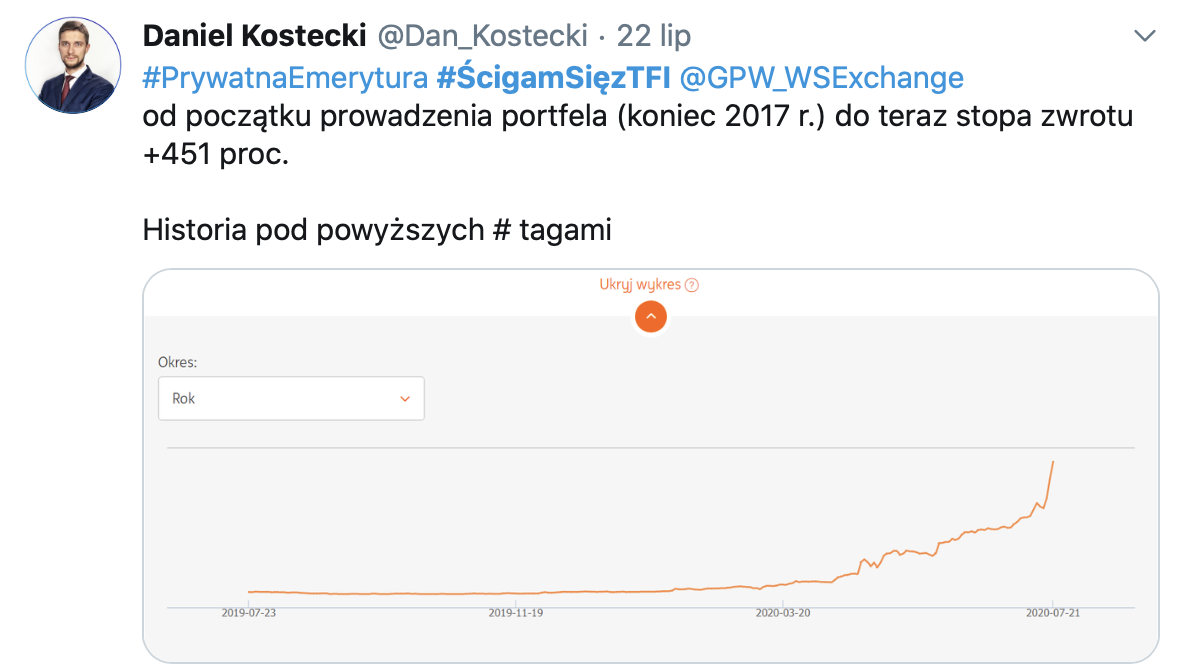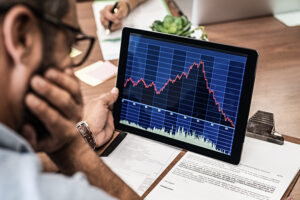Daniel Kostecki - proves that analysts can also earn [INTERVIEW]
Daniel Kosteckiwith whom I had the pleasure to conduct this interview on the financial markets has been present since 2007. He is currently working as the company's chief analyst Conotoxia. Apart from his work as an analyst, Daniel also (successfully) deals with investing on his own account. He is one of the few people on the market who successively publishes his results. How does it do? What is it looking for on the market? What fundamental / technical factors does it focus on most? And most importantly - does it make money on the market? 🙂
You can read about this and about his daily work in the following interview. I would like to express my heartfelt thanks to Daniel for the time and knowledge he shared with us!
Daniel Kostecki - An analyst can also make money on the market!
Could you explain to our readers how your adventure with financial markets began?
It all started in college. It was almost like in the movie "Inception", where one thought, one word can influence the course of future events :). Namely, a professor in Finance and Banking asked us students a question: who holds bonds, who owns shares, who invests their money? There was complete silence in the room. As for the Finance and Banking classes and the Economics course, I found it very puzzling. How can you learn something without doing it in practice? Especially since buying bonds or stocks, even for little money, is not something complicated, and market mechanisms can already be learned in practice.
It was then that I decided to set up my first brokerage account to have a practical idea of what I was going to learn about. This is also the case today. As a financial market analyst, I would not be able to tell my viewers and readers about the markets without participating in them. That wouldn't be credible on my part, and I'd feel bad about it myself.
You have been working as a market analyst since 2010. Could you please tell us what your "typical" day at work looks like? How are you preparing for it?
He looked completely different at the beginning, and now he looks completely different. Previously, I focused 100 percent. on technical analysis. Therefore, I was examining the charts from morning to evening at several time intervals. I knew them by heart, not fully paying attention to other events. This changed with time and experience as new information and price drivers came in.
In the work of an analyst, in the media, it is important to bring the context closer to viewers and readers. It's hard to say that the price of a given instrument has increased because, for example, it broke out of the flag pattern after the earlier Harami;). This would be totally incomprehensible to most. Hence, over time, I had to start, in addition to observing the charts, to add macroeconomic data, central bank policy and factors fundamental to the markets.
Hence, a typical day consists in the current monitoring of macroeconomic events, economic data, statements of central bankers or politicians, if they have an impact on the market, along with the observation of charts. In addition, there is reading of studies from various institutions in order to supplement the information with the views of other people, because you may overlook something yourself. Then it is time to organize all the news into a meaningful whole and draw conclusions and pass them on to viewers and readers, for example in comments on the website forex.cinkciarz.pl or during the broadcast on the channel YouTube Conotoxia Forex. It is therefore a continuous process with only an overnight break for sleep.
You run a very interesting project to build a private pension. The results that you present on Twitter, for example, are really impressive and probably many TFIs are envious of such rates of return. Could you let go of the secret of your choice of assets for your portfolio? What approach are you coming from (technical / fundamental, short term / value investing)?
This project started quite spontaneously after I started my own business and minimal pension contributions. At that time, it was obvious that the current income should be allocated funds for retirement. Hence the idea for #Private Retirement, and since many people also care about it in this way, investing indirectly in the markets through funds, there was #ScigamSięzTFI. Such a "race" should of course be treated with a distance.
You can follow the progress of Daniel's investments on his Twitter profile under the hashtag #ScigamSięzTFI.

Coming back to the question, after this brief introduction, the portfolio initially contained only investment certificates with exposure to various commodity markets. Both long and short. Most of the decisions were made on the basis of CFTC reports and fairly simple technical analysis. The investment horizon was rather long-term, as it is difficult to find day trading at the moment due to the current obligations.
The retirement wallet accelerated as the pandemic hit. The beginning is an exposure to decline DAX indexand then selecting "covid" companies. This time was relatively easy to invest because the group of companies that can earn in such an environment has narrowed significantly. Completely different than in "normal" times, when each company can make money and you have to wonder which can earn more and faster. Then the choice is very difficult.
The current approach is both fundamental analysis and elements of technical analysis with a rather long-term investment horizon. The dividend policy of companies is also important, which is important in the environment of low interest rates.
Being flexible in the marketplace during such "turbulences" as covid, you will admit, is invaluable. Is your wallet like that too? Are you rebuilding it? If so, what prompts you to do so? Situation? Realized profit?
True, nothing is constant with so many risk factors and such volatility. You cannot brick your viewpoint because you can get stuck in the wrong investment for a long time. Appropriate assumptions are made before each transaction. For example, waiting for the publication of the company's results, estimating these results, checking interest in the company, turnover. These are the factors that determine the decision and then waiting for publication.
Na Forex market we would call it a data game, here we can call it trading for the publication of results, AGM or dividends, of companies with good prospects, low interest at present and lower valuation than assumed. When the right date comes and all assumptions can be confronted with reality, a decision appears what to do next. Whether or not there is a profit is of secondary importance in such a transaction. Then, it may even be sold at a loss and the selection process starts anew or the portfolio does not change if its composition is still prospective.
One of your "technical specialties" is the Elliott Wave Theory. The opinion that learning this idea of understanding the market takes at least two years of reliable work is almost a legend. What's your story with Elliott? Is learning really that time-consuming?
My interest in Elliott Wave Theory started with a suggestion from a friend who suggested it to me, knowing that I was generally interested in technical analysis, which I have shared on my blog since 2009. For me, TFE has become the equivalent of a roadmap. The individual elements of technical analysis put together, step by step, as opposed to scattered technical patterns on the chart. Elliott's theory tries to collect all these patterns and embed them in a larger whole, in a larger scheme.
Hence, dealing with this theory can take so long, because first you have to be proficient in classical technical formations, and then try to connect them with segments like waves and make it more meaningful. The problem is that the financial market is not an exact science. You can spend a lot of time learning and the market will do what it wants. In normal life, if we learn, for example, to play the piano for a long time, we will play well or very well - depending on our predisposition. On the other hand, the result on the market is not so simple and straightforward. Nevertheless, it is better to know more than less over time, because when the market finally hits a lane that you can know ahead of time, then all you have to do is check to see if it falls out of them, but that's a matter of position management.
Do you think a good analyst is also a good investor / trader? What are the characteristics of a candidate for an analyst / trader in your opinion?
The analyst and investor can be compared to a coach and athlete. Not every good coach has been a good athlete before, and not every good athlete will be a good coach. However, there are cases where a good athlete also becomes a good coach.
The analyst's task is to search for potentially interesting markets and to try to determine the direction or strength of the trend. What is needed here is perceptiveness, the ability to combine facts, the speed of processing information and drawing conclusions, flexibility in changing your mind along with changing market conditions. The work of an analyst does not involve the stress of investing your own money. Then the clarity of mind and analysis may be greater, because the analyst is not anchored to the market and direction through the prism of investments.
Meanwhile, the investor / trader is already a decision-making person and executing orders on the market. A cool approach to money, gains and losses, as well as not hesitating in implementing a strategy or approach are key here. There is stress associated with it, often the lack of an objective view. Here we have a set of completely different qualities that are needed to participate in the market compared to the analyst.
Hence, there may be good analysts who may have difficulty with emotions in the market and order execution, including profit or loss taking, and there may also be traders who will not be able to clearly discuss, describe how analysts see what in the market and why they make such and no other decisions. I try to do both as mentioned in the previous question, but these two professions may exist separately because they have different predispositions that may or may not be combined.
Psychology is a very important part of any strategy. What's your method of dealing with stress?
Experience has shown that dealing with one or two markets can be less stressful in short-term trading. Then we can have a bit more control over what we do because we only deal with one instrument. Day trading on 10 values could be much more troublesome and stressful, not to mention concentration.
Hence, if we think about trading on more instruments, then it is worth increasing the investment horizon and the time interval that we are looking at. This, too, can eliminate stress to some extent, because changes do not happen so quickly and on a large scale. Maybe then it will be easier to manage the exposure in the market, and this is what reduces stress.
In the psychology of investing, the most important element is the one that tells you to leave the market as quickly as possible when you are wrong, and in turn to extract as much as possible from the market that goes your way. We can help with this by managing the position in the form of hedging orders.
Do you remember your most painful transaction?
It was a British pound transaction that cleared the entire bill in a matter of hours. Steamed GBP / USD then there was an above-average move, and it was during the great financial crisis. At that time, GBP prices fell by over 400 pips in a few hours. In the meantime, I averaged this position several times, which led to an above-average exposure to the pound, and along with an above-average decline, it led to unpleasant consequences along with valuable science.
What is worse, these transactions appeared after about six months of success, where the account was steadily increasing in value. One day was enough for everything to fall apart. However, I tried to draw conclusions from this failure and I did not give up, on the contrary, it motivated me to continue learning and working on myself.
It was not the market that was at fault then, because the market could do everything, I made the irrational decision to increase my position against the trend and managed my account funds badly. This transaction made me think about how much more I have to do to work on myself.
What advice would you give to someone who is just starting their adventure with financial markets?
Allocate money for it that you can lose. Never risk your last money or the money needed for your daily life.
Hio Do you expect the markets in the near future, looking at the current situation? Hossa on metals? Second lockdown? Dollar appreciation?
I am quite bearish towards the dollar, believing that the dollar will depreciate in the coming quarters. It may be affected by a very loose monetary policy Fed and fiscal policy of the US government along with the huge supply of USD and its easy availability for financial institutions at low cost.
The weak dollar may translate into a bull market in many markets, including industrial metals, oil, precious metals as soon as emotions fall on them, as well as in the cryptocurrency market.
I do not expect a second complete lockdown, because the economic costs are too high and the politicians know it very well. Hence, partial restrictions may appear in the fall, but without the panic and chaos of spring.
From the point of view of the money supply, a possible bull market in the cryptocurrency market, incl Bitcoin. Paper money is issued in every currency in unprecedented amounts, which, given the limited supply of cryptocurrencies and the small scale of this market, can lead to significant increases.
Thank you for the conversation!
Neither the author of the interview nor Conotoxia Ltd. are responsible for the investment decisions made on the basis of the information contained in this interview.






















![Forex Club – Tax 9 – Settle tax on a foreign broker [Download the Application] Forex Club - Tax 9](https://forexclub.pl/wp-content/uploads/2024/02/Forex-Club-Podatek-9-184x120.jpg?v=1709046278)
![Trading View platform – solutions tailored to the needs of traders [Review] trading view review](https://forexclub.pl/wp-content/uploads/2024/03/trading-view-recenzja-184x120.jpg?v=1709558918)
![How to connect your FP Markets account to the Trading View platform [Guide] fp markets trading view](https://forexclub.pl/wp-content/uploads/2024/02/fp-markets-trading-view-184x120.jpg?v=1708677291)
![How to invest in ChatGPT and AI? Stocks and ETFs [Guide] how to invest in chatgpt and artificial intelligence](https://forexclub.pl/wp-content/uploads/2023/02/jak-inwestowac-w-chatgpt-i-sztuczna-inteligencje-184x120.jpg?v=1676364263)


![WeWork – the anatomy of the collapse of a company valued at $47 billion [WeWork, part II] wework bankruptcy story](https://forexclub.pl/wp-content/uploads/2024/04/wework-bankructwo-historia-184x120.jpg?v=1711729561)
![Adam Neumann – the man who screwed up Softbank [WeWork, part AND] adam neumann wework](https://forexclub.pl/wp-content/uploads/2024/04/adam-neumann-wework-184x120.jpg?v=1711728724)





![How to transfer shares to another brokerage office [Procedure description] how to transfer shares to another brokerage house](https://forexclub.pl/wp-content/uploads/2024/03/jak-przeniesc-akcje-do-innego-biura-maklerskiego-184x120.jpg?v=1709556924)

![The most common mistakes of a beginner trader - Mr Yogi [VIDEO] Scalping - The most common mistakes of a beginner trader - VIDEO](https://forexclub.pl/wp-content/uploads/2024/03/Scalping-Najczestsze-bledy-poczatkujacego-tradera-VIDEO-184x120.jpg?v=1711601376)
![Learning patience: No position is also a position - Mr Yogi [VIDEO] Scalping - Learning patience - No position is also a position - VIDEO](https://forexclub.pl/wp-content/uploads/2024/03/Scalping-Nauka-cierpliwosci-Brak-pozycji-to-tez-pozycja-VIDEO-184x120.jpg?v=1710999249)
![When to exit a position and how to minimize losses - Mr Yogi [VIDEO] Scalping - When to exit a position and how to minimize losses - VIDEO](https://forexclub.pl/wp-content/uploads/2024/03/Scalping-Kiedy-wyjsc-z-pozycji-i-jak-minimalizowac-straty-VIDEO-184x120.jpg?v=1710336731)



![Daniel Kostecki - proves that analysts can also earn [INTERVIEW] Daniel Kostecki interview of the forex club](https://forexclub.pl/wp-content/uploads/2020/09/daniel-kostecki-wywiad-forex-club.jpg?v=1599145687)



![Daniel Kostecki - proves that analysts can also earn [INTERVIEW]](https://forexclub.pl/wp-content/uploads/2020/09/zoom-stocks-102x65.jpg?v=1599122413)
![Daniel Kostecki - proves that analysts can also earn [INTERVIEW] copper how to invest](https://forexclub.pl/wp-content/uploads/2020/09/miedz-jak-inwestowac-102x65.jpg?v=1599164401)









